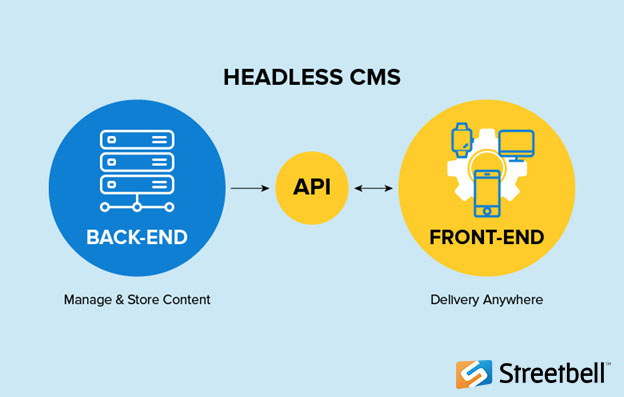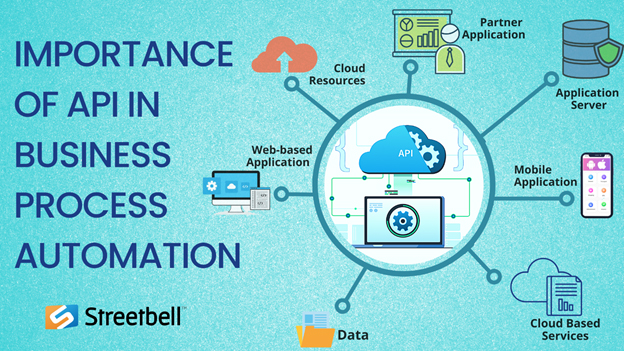
The Significance of APIs in Business Process Automation: Shopygo BPA
- Athul Raj
- Mar 14, 2022

No matter how good it is, there is no single software that has all the functionality required to perform all the desired business operations, because no two businesses are exactly the same. Unless a system was designed specifically for your business, it will never have all the functionality you need.
And that’s where APIs come into play.
In this article, we’ll dive deeper into the benefits of getting your API connection with the Shopygo eCommerce software solution.
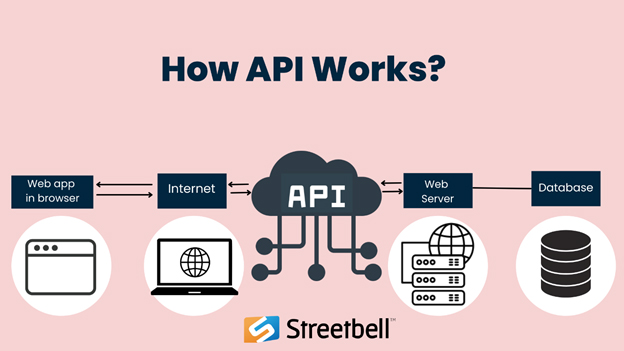
An API (Application Programming Interface) serves as an intermediary, allowing different applications and system components to communicate with each other, exchanging data or services.
Think of all API components as middlemen that quickly facilitate communications between different systems to get things done. API-driven process automation involves replacing manual tasks with calls to an API. In other words, instead of having a human perform that task, we tell a system to do it. APIs are only built once, then endlessly discovered and reused across platforms and applications because they are built using a service-oriented approach.
As an eCommerce store owner, you can best understand what an API is by thinking of the actual process of fulfilling customers’ orders and ensuring the payments have been cleared. This process simplifies the workflow from orders to receiving payments. With API integration, all documents related to an order or a customer - including quotes, contracts, sales and purchase orders, shipping documents, and invoices – can be accessed via simple API calls. With better visibility, one has better order management, as well as workflows that generate significant shipping documents and invoice receipts automatically. This will facilitate the time taken from order to payments while carrying out the entire process successfully.
A program that requires access to information or functionality from other programs calls the API of that other software, passing along the requirements of what data or functionality it requires. The other software returns the data or functionality requested by the original program.
APIs allow your business to automate the transfer of data between different applications and systems, without writing dozens or hundreds of lines of code manually. You may take advantage of their existing functionality without developing features from scratch. With API integration, you can pick and choose elements of your online store directly from other companies’ applications and programs to create an eStore according to your specific business needs.
For example, you can integrate your eStore site with a shipping provider's account and import your data for orders and shipments. This way, you can streamline your shipping operations on a single platform and synchronize your operations workflow in a logical way.
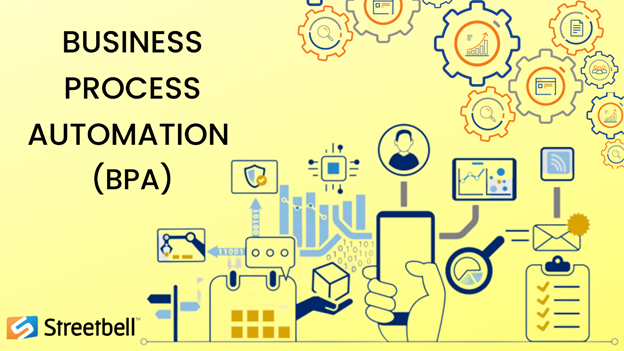
So, does every business automation process involves an API?
The answer is no.
Traditional approaches to BPA include developing custom code, implementing standalone tools such as a BPM app, and integrating systems through point-to-point integrations.
When the primary system used to facilitate the automation of a business process is not able to perform all of the necessary tasks, existing business systems are customized to fill those functionality gaps using custom code. Custom scripts may be very helpful in managing connections for in-house software (and because there is someone ready to invest the time to write the code). However, the issue here is the lack of visibility into the custom code. This visibility is needed to make implementing updates and modifications easier. Subsequently, systems are ultimately connected point-to-point, which leads to technical debt and complexities as new automation requirements and time-consuming maintenance challenges emerge.
The alternative to adding a custom code is to implement standalone solutions like Business Process Management (BPM) software. These programs are easier to use, but they usually offer limited automation capabilities which cannot be reused for other processes.
In the long run, the approaches stated here prevent visibility and reuse - two elements that are crucial in automating processes quickly.
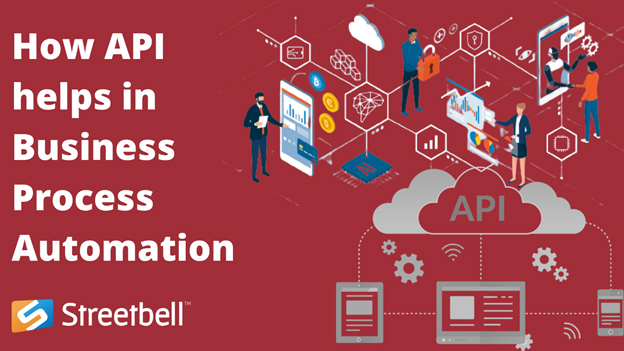
So how exactly do APIs make BPA better?
An API makes it simple for organizations to -
E-commerce fulfilment APIs can help businesses automate, coordinate, manage, organize, and streamline their operations with capabilities such as order fulfilment, inventory control, courier administration, labelling, billing, printing shipment details, tracking, and confirmation alerts.
With this automation in place, every department, from accounting and the warehouse, will have real-time, accurate information available which will improve insight into business data and enable them to process orders and distribute in an efficient way. Your eStore can also deal with more orders, make fewer errors, and speed up the transactions. Thereby, this more streamlined process helps enhance the customer experience. As several admin tasks are eliminated, the business is enabled to reallocate resources to other functions within the business – ones that will actually make a difference to the bottom line, like sales and marketing or customer management. Data collected by the eStore can also be automatically pushed into existing CRM systems to help sales staff with cross-selling and upselling.
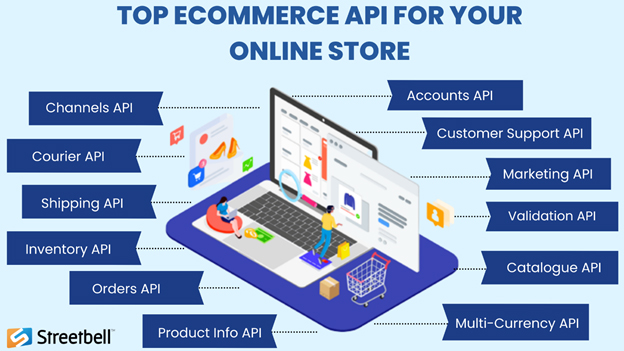
There are different types of eCommerce APIs available for ordering, shipping, tracking, getting products, viewing, buying and selling, and even creating marketing segments.
A product information API lets you extract product details from a database of products that includes details about product description, product ID, product title, product specification, product image, pricing, the number of products, etc. This is an important API for stores that use drop shipping business models and rely on their third-party suppliers for order fulfilment. Supplier API integration eliminates the need for manual order handling by automatically fetching the product details and making products available on the eCommerce store.
Orders APIs include information about orders that are made from your channel. This API syncs order import and export status and shows a list of all placed and available orders in your account. A user can sort and filter the order data as per the date of packaging and shipping. You may also cancel an order, return an order, create bulk import orders, and add inventory for an ordered item.
You can use this API to sort and filter inventory data, check the inventory details of a product's SKU, and update product inventory details for a specified product. Integrating with a catalogue API is a smart way to make catalogue creation and editing easier. The catalogue API can synchronize with multiple product catalogues to keep the inventory up to date. Moreover, it supports multiple categories, complex products, downloadable products, and gift certificates.
This API lets you automate the process of shipping and lets you track details right from the product sale to the package being delivered to a customer. A Shipping API can allow you to connect a logistics provider (like USPS or FedEx) already programmatically supported by your ecommerce platform or add an integration to a new shipping provider. It can also ease fulfilment by allowing services like ShipStation to pull data to create packing slips and labels. It can also automate the process of creating packaging invoices & labels, accurately calculate the shipping rate, shipment booking, tracking shipping labels, and much more.
Couriers API helps in checking for courier options and serviceability in a specific location and creating a request for the pickup of your order. This API can also be used for assigning a unique tracking number to your shipment for you to track the shipment and get information about it.
A multi-currency conversion API allows eCommerce business owners to easily convert currency to the customer’s local currency. This API can also be used to integrate high-quality real-time data into your items in order to increase efficiency and ease the burden on the backend.
The channel API provides information about every integrated channel in your account (such as Shopify, Magento, OpenCart, WooCommerce, and Amazon). This API also displays a list of all the channels already integrated into your online shop’s account. The sellers can integrate to these marketplaces from their existing online stores using these channel API and offers their products all in one place.
With this API you can create, edit, and manage your product catalogue within a few minutes. It also supports integration with other key systems of your business such as order fulfilment, inventory management, and reporting & analysis.
The Validation API verifies the address & other customer details that they enter on the website, identifies a new/existing customer, and decides the possible deliverability issues. This API is used to automate the process of validating and correcting addresses, thus eliminating the hassle of verifying documents.
A Marketing Automation API allows you to automate email marketing functions and segmentation based on the customer's buying behaviours, purchase history, location, and other criteria. A useful API to automatically add customers to an email list and then segment them based on the products they bought, the purchase amount, location or any other segmentation criteria.
Customer APIs, such as the WhatsApp Business API, bring in the ability to implement live location sharing deliveries and tracking of orders. This makes customer support automated.
Accounting APIs allow you to access accounting software and create or integrate applications with it. Accounts API can be used for bookkeeping, payroll, invoicing, taxes, forensic investigation, auditing, and cost analysis, among other things.
The list is not over yet. There are hundreds of other eCommerce APIs which are very crucial for the automation of eCommerce business processes. E-commerce shipping and order fulfilment can be much easier if you use API integration and the right eCommerce platform.
When you work with APIs, every part of your business automation solution works together perfectly. Things like accessing data between different software will be so seamless that it seems like you are working with a single system.
On the other hand, when you’re not using an API, speeding up your business processes can become an issue. The bigger your Store and the more complex it is, the more important is the role of API integrations. Without them, you won’t get the full potential of eCommerce. Even if your eStore is not as big when you are starting out, using this concept from the start will make upgrades easier whenever you require them.





